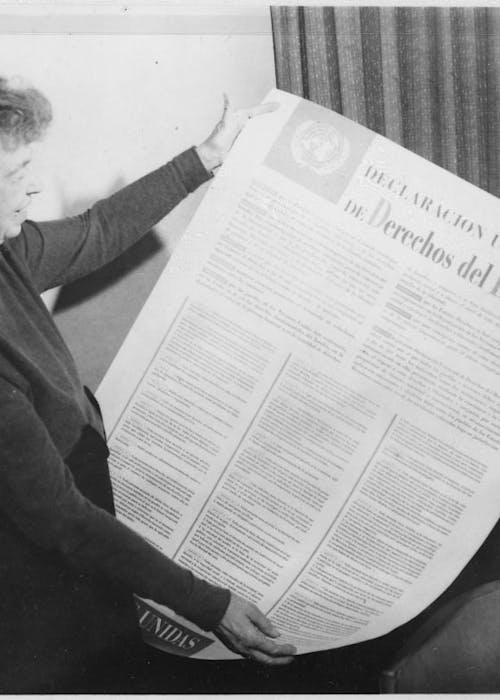
Eleanor Roosevelt, CCC founder and champion of human rights
Insights
October 11, 2019
 Eleanor Roosevelt, one of CCC’s founders, holds the Universal Declaration on Human Rights printed in Spanish.
Eleanor Roosevelt, one of CCC’s founders, holds the Universal Declaration on Human Rights printed in Spanish.
October 11th, 2019 marks the 135th birthday of one of CCC’s founders, Eleanor Roosevelt.
Not long after Roosevelt founded CCC, she was appointed by President Harry Truman as a delegate to the the newly formed United Nations to chair the United Nations Human Rights Commission where she led the drafting of the Universal Declaration of Human Rights (UDHR). The UDHR is arguably the most important document in modern history, and is the most translated document in the world; available in more than 370 languages.
This is impressive, though perhaps not surprising when considering the meaningfulness of the document’s contents. It was the earliest codification of key principles and values of human rights and has served as a foundation for several legally binding treaties that further detailed individuals rights.
These include the International Covenant of Economic, Social and Cultural Rights, and the International Covenant on Civil and Political Rights. Here are a few excerpts from the UDHR:
Article 1:
“All human beings are born free and equal in dignity and rights.”
Article 2:
“Everyone is entitled to all the rights and freedoms set forth in this Declaration, without distinction of any kind, such as race, colour, sex, language, religion, political or other opinion, national or social origin, property, birth or other status.”
Article 20:
“Everyone has the right to freedom of peaceful assembly and association.”
Article 25:
“Everyone has the right to a standard of living adequate for the health and well-being of himself and of his family, including food, clothing, housing and medical care and necessary social services, and the right to security in the event of unemployment, sickness, disability, widowhood, old age or other lack of livelihood in circumstances beyond his control.” “Motherhood and childhood are entitled to special care and assistance.”
Article 26:
“Everyone has the right to education.”
In Articles 25 and 26 it is plain to see how human rights and Roosevelt’s vision shaped CCC’s mission: to ensure every New York City child is healthy, housed, educated, and safe.
We can also look to Article 20, the right to peaceful assembly, as the basis for CCC’s rallies at City Hall or the state capital. And this right — in concert with others like the right to non-discrimination (Article 2) — are the basis for all of our work and the work of many others, such as the honorees at our 2019 Celebration Breakfast. Fran Levenson, this year’s recipient of the Eleanor Roosevelt Award, led the work of the National Committee Against Discrimination in Housing. Maya Wiley founded the Digital Equity Laboratory at The New School, which addresses structural inequities in technology, such as access to broadband internet. Christina Veiga’s journalism in Chalkbeat has been instrumental in the fight for pay parity in the early education workforce. Teens Take Charge are the student-led vanguard of a movement to build an integrated and equitable public education system in New York City.
Roosevelt’s leadership role in and the drafting of the Universal Declaration of Human Rights are not just historical events of the last century. They are the springboards making possible our ongoing and future policy advocacy. The same way we continue work to ensure the implementation of Raise the Age legislation, and pay parity for all of NYC’s early education workforce, our work to promote universal human rights continues.
This is the first in a series of blogs where we’ll further explore how the UDHR shapes the world of child and family policy research and advocacy, including our look at international children’s rights, and how these rights shape CCC’s approach to community-based research and campaigns.

